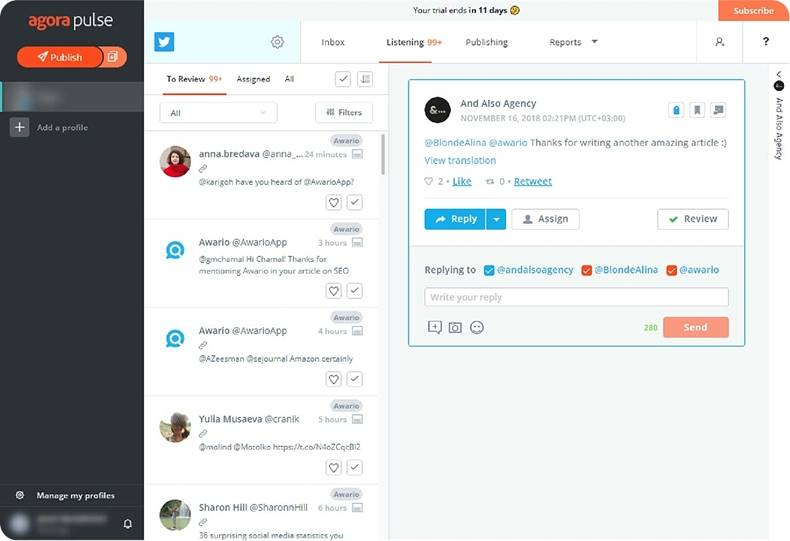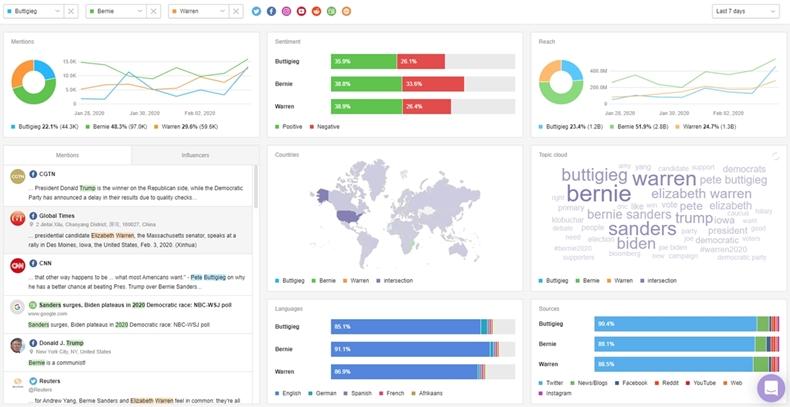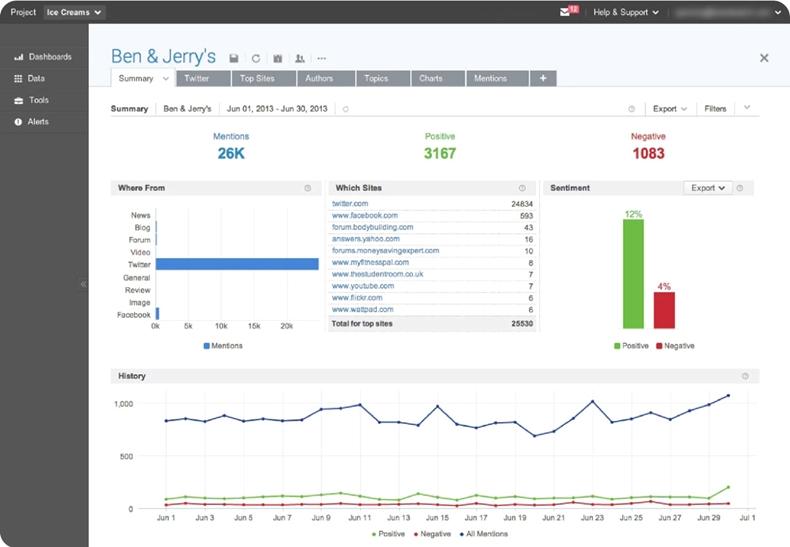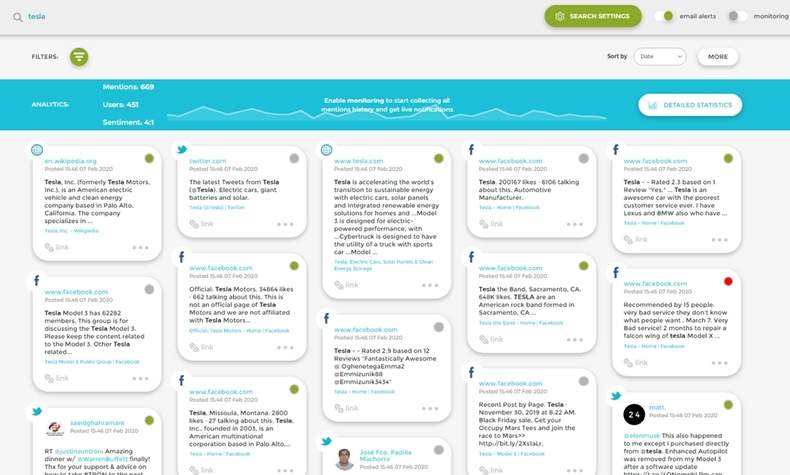So you want to get notified every time someone mentions your topic of interest online: That might be your own name; your company's name (so you can keep an eye on what people think about it); your competitors (so you can stay up to date on their business strategy); topics relevant to your career or industry... The list is long.
The most obvious option to help you keep track, besides obsessively googling these topics every day, is setting up Google Alerts.
The problem? There are a lot of downsides to Google Alerts.
First, it's notoriously unreliable: Considering the minuscule number of sources it does monitor, it doesn't do a very good job of it, frequently missing relevant mentions.
For years, people have complained about it:
1) how is google alerts so bad, and 2) how was it not shut down 10 years ago?
— Max Lynch (@maxlynch) August 28, 2017
Second, nowadays the biggest news happens not on blogs and websites (that's where it gets reported a couple of hours later) but on social media. Google Alerts doesn't monitor social media. It won't send you a tweet criticizing your product or an Instagram post from an influencer praising it. It simply doesn't access those platforms.
And, third, if you're considering Google Alerts for business purposes, you need something more powerful that will let you see who is talking about your brand, what feelings they express, what opinions they share. How those feelings and opinions add up to make up your reach, brand awareness, share of voice, and other important marketing KPIs.
Basically, something that will let you analyze your target audience, understand your brand reputation, do marketing research...
Now that we understand why Google Alerts is not enough, let's see what alternatives are there on the market.
In this article, I tried to gather Google Alerts alternatives that fit different marketing budgets and needs, in the hopes that you'll be able to find a tool that suits you. I chose to highlight three aspects of these Google Alert alternatives:
- Main features
- What makes the tool stand out
- Pricing
So, without further ado, let's dive in—in alphabetical order.
1. Agorapulse: An All-in-One Social Media Management Tool
Since we're talking about the importance of social media, why not consider investing in one of the Google Alerts alternatives that also helps you manage social media as well as monitor mentions of your keywords? Agorapulse is a good candidate for that role.
Let's start with monitoring-like features. Agorapulse can pull mentions of your keywords from Facebook, Twitter, Instagram, and YouTube, but with some caveats.
From Facebook and Instagram, it can gather only public @mentions of your Pages—i.e., mentions that tag your page. If someone doesn't use @ or shares your URL, for example, Agorapulse won't be able to find those posts.
For YouTube and Twitter monitoring, you can set some limitations such as words you don't want to see in your mentions, location, and language of the mentions.
You can interact with mentions right in the tool, liking, resharing, and responding to them, as well as labeling, bookmarking, or assigning them to a teammate.
Since it's first and foremost a social media management tool, Agorapulse allows you to schedule posts to Facebook, Instagram, LinkedIn, Twitter, and YouTube, set up a content schedule, and manage your direct messages from one place.
It also provides users with multiple reports that include analytics of your mentions and other metrics, such as your social media profiles' reach, engagement, your team's response rate and more.
What Makes Agorapulse Stand Out
Actionable recommendations. Based on the analysis of your social media performance, the tool will give you recommendations on the best times to post, the best hashtags to use to drive engagement, the best content to publish to grow reach, and so on.
Instagram Stories report. Instagram Stories are always a pain for social media marketers, since there are so few ways to pull data from them in any kind of report except for maniacally putting down every stat from every story before they disappear. Agorapulse is a much more convenient solution for analyzing your Stories performance and reporting on it.
An app version. To make sure you always have access to your mentions and social media schedule, Agorapulse provides an app in addition to the Web-based solution.
How to Set It Up
You can start your free trial by signing up with an email or your Facebook account. The tool will ask you to connect those social media accounts you want to manage. You can then go to the Listening tab to set up additional searches for Twitter and YouTube (the tool will pull your @mentions from Facebook and Instagram automatically).
Pricing
There's a two-week free trial, after which you can buy the tool at the starting price of $99 per month.
2. Awario: A Budget-Friendly Social Listening Tool
The second tool on the list of Google Alerts alternatives is one that will deliver excellent results but won't deplete your social media budget.
Awario (developed by my company) is social listening software. It allows you to work with individual mentions; at the same time, it processes vast amounts of social listening data for business insights.
In addition to Google Alerts' country and language filters, Awario lets you select what URLs you want to monitor, negative keywords (mentions containing negative keywords would not be included in reports), date ranges, and sources. Awario pulls mentions from...
- YouTube
- News sites and blogs
- The rest of the Web
Awario's real-time monitoring results in real-time mentions of your keywords in the feed. But it also collects historical data: If you want to take a look at who mentioned your keywords months or, in some cases, years ago, you can.
You can look through individual mentions and interact with them right from the tool in the Mentions Feed. You can sort and organize the mentions in various ways: for example, to deal with negative mentions first—a great feature for community management and social customer support teams.
Speaking of which, the Team Members feature lets multiple people use Awario at once and lets the admin grant them different levels of access.
Awario is also a tool for conducting marketing research, since it's able to analyze large amounts of social data and derive valuable insights from it. The tool breaks down your keywords'...
- Reach
- Location
- Language
- Sentiment (positive, negative, neutral)
- Words associated with them
All those analytics are aggregated into social-listening reports that provide valuable insights about your brand or any other keyword you choose to monitor: You can see the overall popularity of your keywords in the Mention Statistics report; compare several alerts in the Alert Comparison report to find out how people feel about different topics; and even see the most influential people posting about these topics in the Influencers report.
And you don't have to log in to Awario to see new mentions: The tool can send notifications via pop-up, email, and the Slack channel of your choice, with the frequency you set.
Most notable about Awario is the many ways you can use it—from managing brand reputation to gathering intel on your competitors, to link building. It's a Swiss army knife of Google Alerts alternatives.
(Disclosure: I'm affiliated with Awario.)
What Makes Awario Stand Out
Boolean search mode allows you to create highly targeted keyword queries—perfect for marketing research or for instances when your keyword is a common word used in different contexts. You can switch between two ways of designing a query whenever you like.
Awario Leads is a free add-on that looks for social media leads. You feed it a brief description of your product or service and the names of your competitors, and it finds posts from people asking for recommendations and looking for alternatives.
API integration lets you pull data from Awario into your own CRM or tool.
How to Set It Up
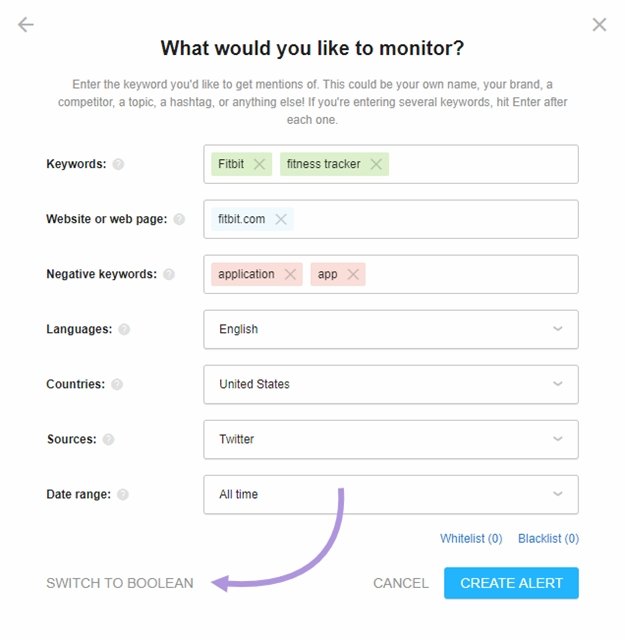
You can start a free trial with no credit card information required. From there, you can create your first alert by submitting some keywords and selecting filters if you need any. Awario's UI is intuitive, so there is barely a learning curve for using the tool.
Pricing
Once your free trial runs out, the plans start at $29 per month. Some features are available only in the Pro and Enterprise plans, which cost $89 and $299 per month, respectively.
3. Brandwatch: An Analytics Powerhouse Solution
If I could make a mechanical analogy, Google Alerts to Brandwatch is what a dairy cart is to the latest model of Tesla (or Cybertruck if that's what floats your boat).
Brandwatch is one of the most impressive Google Alerts alternatives, covering the biggest number of platforms and offering the most sophisticated and complicated analytics. Not so coincidentally, it's also the most expensive.
Since there's just so much data to study, the tool's UI may seem complicated at first glance. The part most familiar to Google Alerts users will be the Dashboard, where you can see individual mentions of your keywords. Brandwatch monitors Facebook, Twitter, Instagram, YouTube, Pinterest, Sina Weibo, VK, QQ, news sites, blogs, the Web, and more.
The big draw is the analytics dashboards. There are three of them: Consumer Research, Brandwatch Audiences, and Brandwatch Vizia:
- Consumer Research presents you insights on your keywords, such as reach, sentiment, changes in the number of mentions, and so on.
- Brandwatch Audiences dives deep into your audience. It shows you who mentions your keywords, what their interests are, whom they follow. You can also access a database of more than 400 million people to analyze based on relevant keywords and demographic data. This tool also allows for audience comparison, so you can see your different target audiences juxtaposed against each other.
- Brandwatch Vizia is the tool for reporting and visualizing all of the insights Brandwatch provides. You can customize your reports in various ways, choosing how to present data to your colleagues and stakeholders, and you can combine different sets of data in one report.
What Makes Brandwatch Stand Out
AI. Brandwatch uses machine-learning technologies to alert you to sudden changes in data—for example, if there's a sudden surge of mentions. You can also train the tool to automatically categorize data however you want.
Integration with other tools. Since it' so data-driven, it's only natural that Brandwatch be friends with other analytics tools, such as Google Analytics, Hootsuite, Salesforce, and their alternatives.
How to Set It Up
To get to play with the tool, you'll have to request a demo first. Once you're in the tool, you will see the dashboard, and to create your first query you'll need to click Data - Queries. By default, Brandwarch uses Boolean operators to create queries.
Pricing
The prices start at $1,000 a month; there's no free trial, but you can request a demo.
4. Social Searcher: An Advanced (and Free) Google Alerts
Not every marketer can afford Brandwatch prices—or any costs, for that matter. For them, the best way to monitor mentions might be one of the free alternatives to Google Alerts. And one of the best is Social Searcher.
The tool looks for mentions of your keyword on Facebook, Twitter, Instagram, Reddit, Dailymotion, Tumblr, Vimeo, VK, Flickr, and websites. When setting up your search, you can exclude some sources and specify negative keywords.
Once you see the mentions of your keywords on the dashboard, you can sort them by date or popularity, and filter them by content type (link, video, photo, etc.) or sources.
Social Searcher even provides you with some analytics, including sentiment, most popular users, most popular links shared, content types, and associated keywords.
The tool will send you daily emails with new mentions.
What Makes Social Searcher Stand Out
It monitors some really obscure sources, such as Dailymotion.
The content type metric shows you analytics based on the different types of content, something I haven't seen in other tools.
Did I mention it's free (more below)?
How to Set It Up
The process is extremely simple: On the starter page, you can put in your keywords (you don't even need to sign up with an email). Later, in search settings, you can add negative keywords and specify sources you want to monitor. Granted, to turn on email alerts, you'll have to sign up with email.
Pricing
I know I said the tool is free, but without paying you get only 100 searches a day. Paid plans offer you more searches and more alerts, as well as access to saved posts and API. The prices start at €3.49 per month.
Parting Words
These four tools are a good representation of the brand new world of mention-monitoring you can discover if you quit Google Alerts. Never miss a mention of your keywords, analyze data, and finally start paying attention to social by choosing one of these alternatives to Google Alerts.
